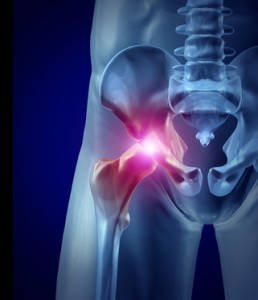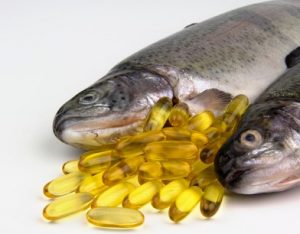Fish Oil And Osteoarthritis
Author: Dr. Stephen Chaney
 Osteoarthritis is not just painful. It is one of the leading causes of disability in this country. And because the joint pain associated with osteoarthritis limits activity levels, it is linked to:
Osteoarthritis is not just painful. It is one of the leading causes of disability in this country. And because the joint pain associated with osteoarthritis limits activity levels, it is linked to:
- Obesity
- The diseases associated with obesity (diabetes and heart disease).
-
- Osteoarthritis increases the risk of heart disease by 50%.
- Premature death associated with the increased prevalence of obesity, diabetes, and heart disease.
-
- Osteoarthritis increases the risk of all-cause mortality by 55%.
If osteoarthritis were rare, these statistics would just be an interesting side note. But osteoarthritis is the most common form of arthritis. It affects more than 32 million Americans. And it is costly. It costs the American economy:
- $65 billion in health care costs.
- $17 billion in lost wages.
- $136 billion in total costs.
Conventional therapy for osteoarthritis is treatment with anti-inflammatory drugs, but they have side effects. They may even increase the risk of premature death in some individuals.
What about natural anti-inflammatory nutrients and phytonutrients? Two that have received a lot of press in recent years are omega-3s (fish oil) and curcumin.
A recent meta-analysis (NK Senftleber et al, Nutrients, 9: 42, 2017) of 42 clinical studies on the effects of omega-3s on various types of arthritis found that:
- There is moderate quality evidence that omega-3s reduce the pain associated with rheumatoid arthritis. Basically, this means that there is strong, but not definitive, evidence that omega-3s reduce the pain of rheumatoid arthritis. Other general conclusions with respect to rheumatoid arthritis were:
-
- The best results were obtained from fish oil preparations with an EPA/DHA ratio of >1.5, suggesting that EPA is more beneficial than DHA.
-
- Early studies suggested that the optimal dose of omega-3s was ≥2.6 g/day for ≥12 weeks.
- There was low quality evidence for an effect of omega-3s on osteoarthritis. Only 5 clinical trials have been published on the topic and the results of those studies are conflicting.
The data for an effect of curcumin on osteoarthritis pain are even more limited. There is some evidence it might be beneficial, but the studies are small and are conflicting.
In this week’s issue of “Health Tips From the Professor” I discuss an exploratory study (JC Kuszewski et al, Rheumatology Advances In Practice 4: 1-9, 2020) on the effect of omega-3s and curcumin on osteoarthritis pain.
How Was The Study Done?
 You are probably wondering, “What is an “exploratory study?” Let me start by providing you with a little perspective from my years of heading a cancer research laboratory at the University of North Carolina:
You are probably wondering, “What is an “exploratory study?” Let me start by providing you with a little perspective from my years of heading a cancer research laboratory at the University of North Carolina:
Clinical studies are expensive. And if you are trying to study an approach that has not already proven to be successful, the money needed to fund the study can be hard to come by. It is a “Catch 22” situation. You need to conduct an “exploratory study” to show your project is likely to succeed before the funding agency will give you money to fund your project.
But where do you get the money to fund your exploratory project? One way that investigators overcome that barrier is to use data from a previous study that was originally designed for a different purpose. The study I will describe today is an example of that approach.
The study utilized data collected from a clinical trial designed to measure the effect of omega-3s and curcumin on brain function in older adults. The study recruited 152 older adults (average age = 65) who were overweight to obese (average BMI = 31) and sedentary (˂55 min/week of physical activity) from New South Wales, New Australia.
The participants were randomly divided into 4 groups:
- Placebo group. [Note: The fish oil placebo contained 20 mg of fish oil so it would match the odor of the fish oil supplement, and the curcumin placebo contained yellow food dye so it would match the color of the curcumin supplement.]
- Fish oil group (2,000 mg DHA & 400 mg EPA per day).
- Curcumin group (160 mg/day curcumin).
- Fish oil + curcumin group.
Participants were followed for 16 weeks. At the beginning and end of the study participants filled out questionnaires assessing (among other things):
- The severity of their chronic osteoarthritis pain.
- Disabilities caused by osteoarthritis in the participant’s daily life (physical distress, sleep disturbances, psychological distress, loss of productivity, physical limitations, physical deconditioning due to reduction in physical activity, and financial hardship).
- Their physical and mental wellbeing during the past 4 weeks.
- Their mood during the past 7 days.
Do Omega-3s Oil Your Joints?
- Omega-3 supplementation reduced chronic osteoarthritis pain by 42%.
- Omega-3 supplementation reduced disability associated with osteoarthritis by 40%.
-
- The reduction in pain and disability in participants supplemented with fish oil was greatest in those who reported the highest pain/disability at the beginning of the study.
-
- The reduction in pain was associated with an improved perception of physical and mental wellbeing.
-
- The reduction in pain was also associated with a decrease in depression and other mood disturbances.
- Curcumin did not affect pain or osteoarthritis burden either alone or paired with omega-3s.
The authors concluded, “Our findings indicate potential for fish oil supplementation to reduce mild osteoarthritis pain and burden in sedentary overweight/obese older adults…,which was associated with improved wellbeing.”
What Are The Pros And Cons Of This Study?
The results for the effects of omega-3s on osteoarthritis were highly significant. In addition, the questionnaires used were well designed to capture the intensity and location of pain, mood, and feelings of wellbeing.
Cons:
This was an exploratory study using data collected from a study designed to measure the effect of omega-3s and curcumin on brain health in older adults. It was not ideally designed to measure the effect of omega-3s and curcumin on osteoarthritis.
If the original study had been intended for investigating the effect of these supplements on osteoarthritis, it would have been designed differently:
- Participants would have been recruited into the study based on the presence and intensity of osteoarthritis pain.
- The diagnosis of osteoarthritis would have been confirmed by X-rays.
- Participants would have been admitted into the study only if they had moderate to severe osteoarthritis pain. Most of the participants in this study had only mild osteoarthritis pain. That may have limited the ability of this study to find an effect of curcumin on osteoarthritis pain.
- The design of the omega-3 supplement would have been different.
-
- Because the original study was designed to determine the effect of omega-3s on brain health, the omega-3 supplement chosen had more DHA than EPA.
-
- Had the study been designed to determine the effect on omega-3s on an inflammatory disease like osteoarthritis, the omega-3 supplement would have had more EPA than DHA.
- The curcumin supplement was also not ideally designed for this study. The curcumin supplement used in this study contained only 160 mg of curcumin and contained no other ingredients. Well-designed curcumin supplements usually contain around 500 mg curcumin standardized to 95% curcuminoids plus piperine to enhance the absorption of the curcumin.
In the words of the authors, “Further studies are warranted to evaluate the benefits of fish oil, alone or as an adjunct to pharmacotherapy, in patients diagnosed with osteoarthritis who suffer moderate-to-severe pain…” In other words, they now intend to use the data from this exploratory study to apply for funds to conduct a larger study specifically designed to measure the effects of omega-3s on osteoarthritis pain.
The study limitations described above, severely restricted the ability of the study to detect any beneficial effect of curcumin on osteoarthritis pain. The effect of curcumin on osteoarthritis pain is probably less than the effect of omega-3s, but it would be premature to conclude that it has no benefit. However, they obtained no data from their “exploratory study” to justify a follow-up study on the effect of curcumin on osteoarthritis pain.
Fish Oil And Osteoarthritis
 This study suggests that 2.4 grams/day of omega-3s may be equally effective at reducing osteoarthritis pain and the effects that osteoarthritis pain has on both physical health and psychological health. However, because this study has several limitations, the evidence cannot be considered definite.
This study suggests that 2.4 grams/day of omega-3s may be equally effective at reducing osteoarthritis pain and the effects that osteoarthritis pain has on both physical health and psychological health. However, because this study has several limitations, the evidence cannot be considered definite.
If you have either rheumatoid or osteoarthritis, I recommend trying omega-3 supplementation. Based on the studies described above, you might want to aim for 2-3 g/day of omega-3s with an EPA/DHA ration of 1.5 or greater.
As with any natural approach, this will work better for some people that for others. However, don’t forget that omega-3s are also important for heart health, healthy blood pressure, brain health, and a healthy pregnancy (https://www.chaneyhealth.com/healthtips/omega-3s-during-pregnancy-are-healthy/). If they also happen to reduce your arthritis pain, that is an extra benefit.
As usual, I recommend a holistic approach. You should also:
- Follow an anti-inflammatory diet.
- Keep active.
- Aim for a healthy weight.
- Add antioxidant and polyphenol supplements.
These lifestyle changes should allow you to reduce or eliminate any pain medication you may be taking.
Finally, if you are on blood thinners, consult with your physician before adding omega-3 supplements to your diet. My preference is to incorporate omega-3s and reduce other medications, but that is a discussion you need to have with your doctor.
The Bottom Line
A recent meta-analysis has concluded there is moderate quality evidence that omega-3s reduce the pain associated with rheumatoid arthritis. Basically, this means that there is strong, but not definitive, evidence that omega-3s reduce the pain of rheumatoid arthritis. Other general conclusions with respect to rheumatoid arthritis were:
- The best results were obtained from fish oil preparations with an EPA/DHA ratio of >1.5, suggesting that EPA is more beneficial than DHA.
- Earlier studies suggested that the optimal dose of omega-3s was ≥2.6 g/day for ≥12 weeks.
However, there have been few studies on the effect of omega-3s on osteoarthritis. A new exploratory study looked at the effect of 2.4 g/day of omega-3s for 16 weeks on the pain and disability associated with osteoarthritis. It found:
- Omega-3 supplementation reduced chronic osteoarthritis pain by 42%.
- Omega-3 supplementation reduced disability associated with osteoarthritis by 40%.
-
- The reduction in pain and disability in participants supplemented with fish oil was greatest in those who reported the highest pain/disability at the beginning of the study.
-
- The reduction in pain was associated with an improved perception of physical and mental wellbeing.
-
- The reduction in pain was also associated with a decrease in depression and other mood disturbances.
The authors concluded, “Our findings indicate potential for fish oil supplementation to reduce mild osteoarthritis pain and burden in sedentary overweight/obese older adults. Further studies are warranted to evaluate the benefits of fish oil, alone or as an adjunct to pharmacotherapy, in patients diagnosed with osteoarthritis who suffer moderate-to-severe pain…”
If you have either rheumatoid or osteoarthritis, I recommend trying omega-3 supplementation. Based on the studies described above, you might want to aim for 2-3 g/day of omega-3s with an EPA/DHA ration of 1.5 or greater.
As with any natural approach, this will work better for some people that for others. However, don’t forget that omega-3s are also important for heart health, healthy blood pressure, brain health, and a healthy pregnancy. If they also happen to reduce your arthritis pain, that is an extra benefit.
As usual, I recommend a holistic approach. You should also:
- Follow an anti-inflammatory diet.
- Keep active.
- Aim for a healthy weight.
- Add antioxidant and polyphenol supplements.
These lifestyle changes should allow you to reduce or eliminate any pain medication you may be taking.
Finally, if you are on blood thinners, consult with your physician before adding omega-3 supplements to your diet. My preference is to incorporate omega-3s and reduce other medications, but that is a discussion you need to have with your doctor.
For more details read the article above.
These statements have not been evaluated by the Food and Drug Administration. This information is not intended to diagnose, treat, cure, or prevent any disease.


